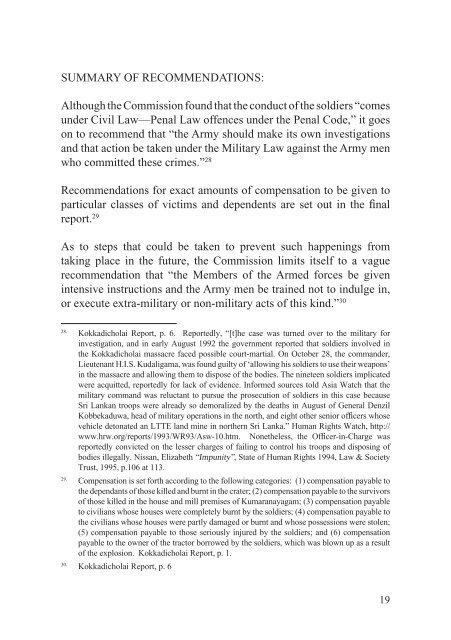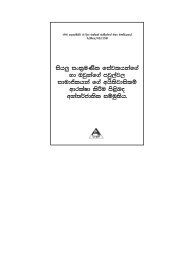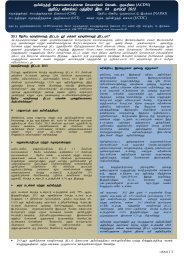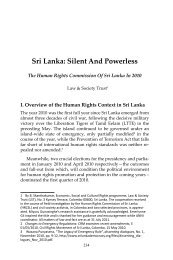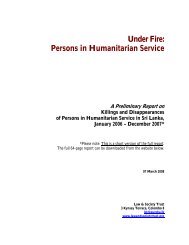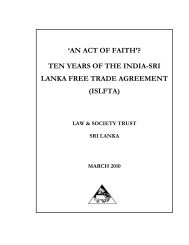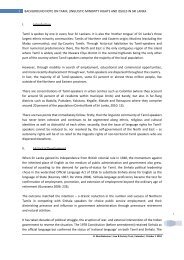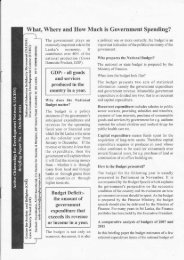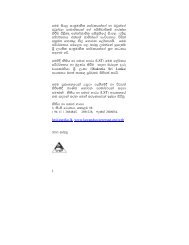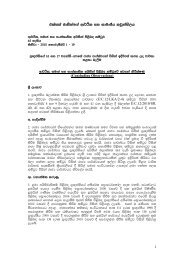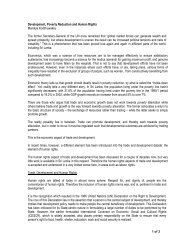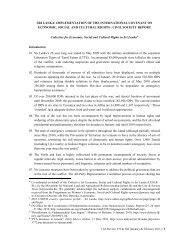sri lanka's commissions of inquiry - Law & Society Trust
sri lanka's commissions of inquiry - Law & Society Trust
sri lanka's commissions of inquiry - Law & Society Trust
Create successful ePaper yourself
Turn your PDF publications into a flip-book with our unique Google optimized e-Paper software.
SUMMARY OF RECOMMENDATIONS:<br />
Although the Commission found that the conduct <strong>of</strong> the soldiers “comes<br />
under Civil <strong>Law</strong>—Penal <strong>Law</strong> <strong>of</strong>fences under the Penal Code,” it goes<br />
on to recommend that “the Army should make its own investigations<br />
and that action be taken under the Military <strong>Law</strong> against the Army men<br />
who committed these crimes.” 28<br />
Recommendations for exact amounts <strong>of</strong> compensation to be given to<br />
particular classes <strong>of</strong> victims and dependents are set out in the final<br />
report. 29<br />
As to steps that could be taken to prevent such happenings from<br />
taking place in the future, the Commission limits itself to a vague<br />
recommendation that “the Members <strong>of</strong> the Armed forces be given<br />
intensive instructions and the Army men be trained not to indulge in,<br />
or execute extra-military or non-military acts <strong>of</strong> this kind.” 30<br />
28.<br />
Kokkadicholai Report, p. 6. Reportedly, “[t]he case was turned over to the military for<br />
investigation, and in early August 1992 the government reported that soldiers involved in<br />
the Kokkadicholai massacre faced possible court-martial. On October 28, the commander,<br />
Lieutenant H.I.S. Kudaligama, was found guilty <strong>of</strong> ‘allowing his soldiers to use their weapons’<br />
in the massacre and allowing them to dispose <strong>of</strong> the bodies. The nineteen soldiers implicated<br />
were acquitted, reportedly for lack <strong>of</strong> evidence. Informed sources told Asia Watch that the<br />
military command was reluctant to pursue the prosecution <strong>of</strong> soldiers in this case because<br />
Sri Lankan troops were already so demoralized by the deaths in August <strong>of</strong> General Denzil<br />
Kobbekaduwa, head <strong>of</strong> military operations in the north, and eight other senior <strong>of</strong>ficers whose<br />
vehicle detonated an LTTE land mine in northern Sri Lanka.” Human Rights Watch, http://<br />
www.hrw.org/reports/1993/WR93/Asw-10.htm. Nonetheless, the Officer-in-Charge was<br />
reportedly convicted on the lesser charges <strong>of</strong> failing to control his troops and disposing <strong>of</strong><br />
bodies illegally. Nissan, Elizabeth “Impunity”, State <strong>of</strong> Human Rights 1994, <strong>Law</strong> & <strong>Society</strong><br />
<strong>Trust</strong>, 1995, p.106 at 113.<br />
29.<br />
Compensation is set forth according to the following categories: (1) compensation payable to<br />
the dependants <strong>of</strong> those killed and burnt in the crater; (2) compensation payable to the survivors<br />
<strong>of</strong> those killed in the house and mill premises <strong>of</strong> Kumaranayagam; (3) compensation payable<br />
to civilians whose houses were completely burnt by the soldiers; (4) compensation payable to<br />
the civilians whose houses were partly damaged or burnt and whose possessions were stolen;<br />
(5) compensation payable to those seriously injured by the soldiers; and (6) compensation<br />
payable to the owner <strong>of</strong> the tractor borrowed by the soldiers, which was blown up as a result<br />
<strong>of</strong> the explosion. Kokkadicholai Report, p. 1.<br />
30.<br />
Kokkadicholai Report, p. 6<br />
19


